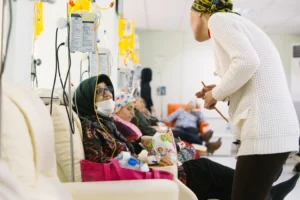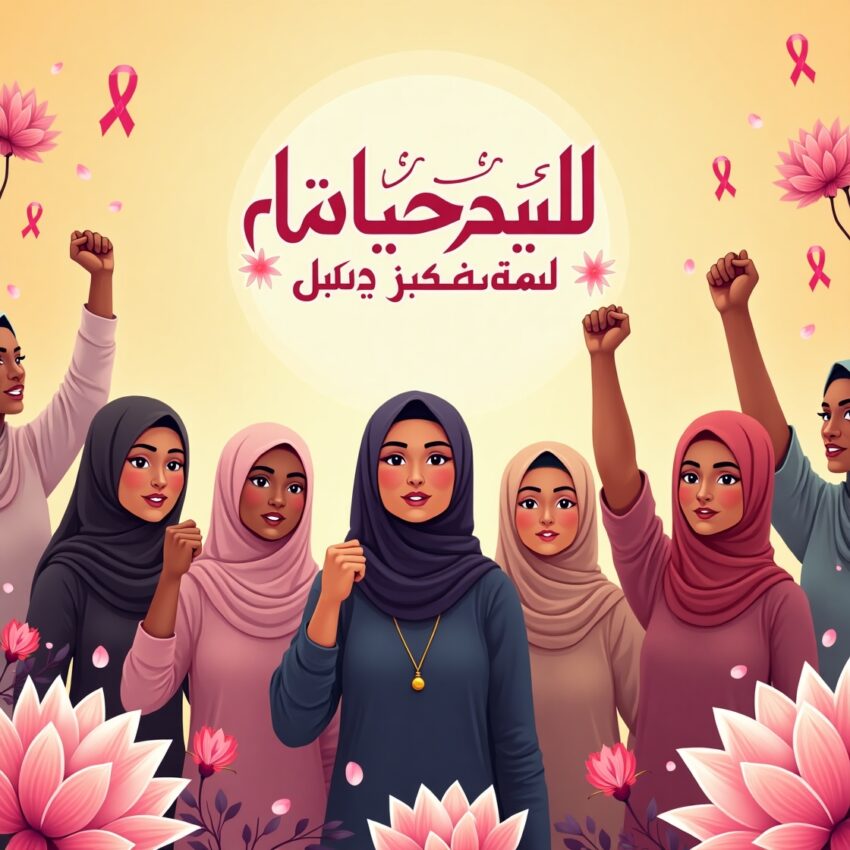Authored by: Humza Rana
Breast cancer ranks as the most prevalent form of cancer among women in the Middle East and North Africa (MENA) region, intertwining with social and emotional ramifications that stem from the socio-cultural environments of women. This literature/narrative review analyzes 74 studies published from 2007 to 2019, delving into the psychosocial dimensions of female breast cancer within the MENA area. It underscores the socio-cultural obstacles to seeking assistance and socio-political elements that shape women’s experiences with the illness. Common themes emerge in 17 of the 22 Arab nations, rooted in shared cultural values. Results indicate that women possess insufficient understanding of breast cancer screening (BCS) and the advantages/techniques of breast cancer self-examination (BSE), attributed to the absence of medical recommendations, alongside fear, shame, cultural convictions, and a deficiency in both formal and informal support systems. Those in rural areas or with lower economic standing face even greater barriers to healthcare access. Women battling breast cancer often report diminished self-worth due to gender roles and a predisposition toward fatalistic beliefs. Cooperation among mass media, health and educational institutions, and prominent social-religious leaders is vital in breaking down psychological and cultural obstacles, including issues related to pain, fear, shame, and modesty—especially for women from lower socioeconomic backgrounds or those residing in crisis and conflict situations.
Increasing Consciousness: Breast Cancer Issues and Remedies for Arab Women
Breast cancer remains the leading cause of cancer among women in the Arab world, with alarming rates of diagnosis and mortality. In the Middle East and North Africa (MENA) region, cultural, socio-economic, and healthcare barriers significantly influence women’s awareness, diagnosis, and access to treatment. As the awareness of breast cancer increases globally, it is essential to understand the unique challenges Arab women face and how to improve prevention, early detection, and support for those diagnosed with this life-threatening illness.
Cultural and Socioeconomic Barriers
In many Arab countries, women face a combination of cultural taboos, stigma, and misinformation when it comes to breast cancer. The fear of societal judgment, along with misconceptions about the disease, prevent many women from seeking regular screenings or self-examinations. In rural areas or lower-income households, these barriers are even more pronounced, where access to healthcare services is limited and education about the importance of early detection remains insufficient. Cultural norms around modesty and femininity often prevent women from openly discussing breast health, further perpetuating a cycle of ignorance and delayed diagnoses.
Lack of Education and Awareness
One of the most critical factors contributing to the high rates of breast cancer in Arab women is the lack of awareness. Many women in the region are unaware of the importance of breast cancer screening (BCS) and the benefits of early detection through breast self-examination (BSE). Health education campaigns need to be integrated into the fabric of society, targeting both rural and urban populations, especially in schools, workplaces, and healthcare settings.
Barriers to Accessing Treatment
Even when diagnosed early, women in the Arab world often face challenges accessing adequate healthcare. In some countries, the healthcare system struggles to provide affordable and timely treatment, especially for those in lower socio-economic groups. The cost of treatment and a lack of support systems—such as counseling or emotional guidance—are critical issues that need attention. For women in conflict zones or war-torn regions, the challenges are exacerbated by the breakdown of healthcare infrastructure, making it even harder for them to receive proper care.
The Role of Media and Community Leaders
Mass media plays an essential role in promoting awareness and educating the public about breast cancer. Television, radio, and social media platforms can help challenge cultural taboos, create supportive spaces for women to discuss their experiences, and advocate for early detection and prevention. Furthermore, collaboration with community leaders, such as religious figures and influential women, can help normalize conversations about breast cancer and emphasize the importance of self-care.

The Way Forward: Strategies for Change
To address the challenges facing Arab women with breast cancer, it is crucial to:
- Promote Education: Launch national campaigns focusing on the benefits of regular screenings, breast self-examinations, and early detection. Integrate breast cancer education into school curriculums and community programs.
- Improve Healthcare Accessibility: Ensure that healthcare services are affordable, accessible, and available to all women, regardless of their socio-economic status or geographical location. Mobile health clinics and telemedicine could offer solutions for rural or underserved communities.
- Foster a Supportive Environment: Encourage open conversations about breast cancer in Arab communities. Support groups, counseling services, and platforms where women can share their experiences will help reduce stigma and provide a safe space for those affected.
- Collaborate with Religious and Cultural Institutions: Work with religious leaders and cultural institutions to promote understanding and support for breast cancer awareness, dispelling myths and encouraging early intervention.
Recommendations and Consequences:
The rising incidence of breast cancer challenges in the Arab region and the intricate nature of factors linked to this disease necessitate a comprehensive strategy. Effective management of the breast cancer burden requires suitable policies such as the enhancement of screening initiatives and prudent resource allocation. It is crucial to highlight the significance of breast cancer awareness and early diagnosis through more structured and extensive implementation of breast cancer screening initiatives. This will lead to an increase in early breast cancer identifications, lower mortality rates, and help alleviate the future global impact of breast cancer. Advancements in public consciousness, healthier lifestyles, better access to affordable therapies, and expanded palliative care are critical areas that must be tackled. These reforms can only be successfully realized through the collaborative efforts of policymakers, healthcare practitioners, and the community at large.
Future
The future of addressing breast cancer issues and remedies for Arab women is poised to see significant advancements, driven by increased awareness, improved healthcare accessibility, and cultural shifts. As public health campaigns and digital media spread awareness, women will become more educated about the importance of early screening, self-examinations, and preventive measures. Mobile health clinics and telemedicine solutions will help improve healthcare access, particularly in rural areas, ensuring timely diagnosis and affordable treatment. Cultural taboos surrounding breast cancer will continue to break down with the support of community leaders and religious figures, fostering open discussions and encouraging women to seek help. Advances in screening technologies, such as AI-powered diagnostic tools and genetic testing, will make early detection more reliable, while personalized treatment options will ensure more effective, tailored therapies. With continued global collaboration and research, Arab women will gain access to cutting-edge treatments and therapies. Additionally, greater attention to psychosocial support and expanded palliative care will improve the overall well-being of women with breast cancer, ensuring they receive comprehensive emotional and physical support. Ultimately, a concerted effort from policymakers, healthcare providers, and communities will lead to improved outcomes for Arab women, empowering them to take control of their health and reducing the stigma surrounding breast cancer.
Conclusion
Increasing awareness and addressing the social, cultural, and economic barriers surrounding breast cancer in the Arab world is vital in improving outcomes for women. By promoting education, enhancing healthcare access, and fostering supportive environments, Arab countries can significantly reduce breast cancer mortality rates and provide better quality of life for women affected by the disease. Collaborative efforts from governments, healthcare providers, and communities will be key to overcoming the challenges, ensuring early detection, and improving treatment accessibility. With these collective actions, the future for women battling breast cancer in the Arab world can be brighter, with a focus on both physical and emotional well-being.
Sources
